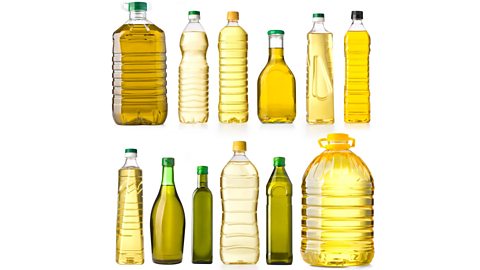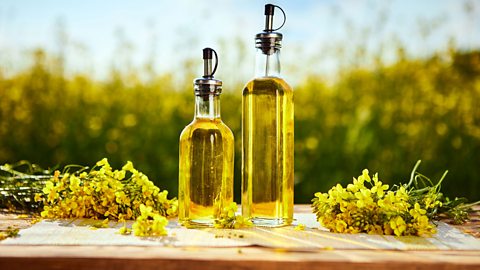Whatãs the best oil to use for cooking?
By Sue Quinn
World events and environmental concerns could mean we have to reconsider the cooking oils we use. So, what are the best alternatives to problematic oils? And are you really using the right oil for the job?

Whether you use it for deep frying, sautûˋing, roasting, or salad dressings, oil is a kitchen staple. But choosing the right one for the job has become more complicated in recent years for a variety of reasons.
On a day-to-day level it can just be plain confusing knowing which oil to pick, with the range available, each with their own characteristics, wider than ever.
World events are currently causing bigger issues. The war in Ukraine has caused a knock-on effect that could see UK business run out of sunflower oil. The country is the worldãs , and with supplies severely restricted, prices have skyrocketed. In fact, the supermarket Iceland recently announced it would temporarily resume using the highly-controversial palm oil in its own-label foods because the price of sunflower oil had since the start of the war.
The lack of sunflower oil is particularly concerning because itãs the nationãs favourite cooking oil; last year, British supermarkets sold almost 61m litres, according to consumer monitoring group Kantar Worldpanel. Vegetable oil is the next most popular (58m litres), followed by olive oil and extra virgin olive oil (31m litres combined), ãspecialtyã oils (16m litres), rapeseed oil (8m litres) and coconut oil (2m litres).
Olive oilãs popularity is partly driven by its health credentials. A cornerstone of the Mediterranean diet, according to , olive oil can help protect against heart disease and a range of other illnesses. Itãs also prized for its flavour. But Britainãs exit from the European Union is said to have created extra administrative procedures for olive oil producers with reports this has led to a decline in exports to the UK and .
So, given current constraints as well as each oilãs practical use, how do you choose the best oils to use in the kitchen?
The best oil for cooking

Oils broadly fall into two categories: refined and unrefined. If the label states an oil is ãvirginã, ãextra-virginã or ãcold-pressedã, chances are itãs and has retained most of its nutrients. Refined oils, on the other hand, have been processed and treated with chemicals to extend their shelf life and remove unwanted flavours and odours. In the process, some of the healthy compounds are lost, but they generally tolerate heat better than unrefined oils.
When you heat oil during cooking ã deep frying, shallow frying, sautûˋing, or roasting ã the molecular structure of the oil breaks down through oxidation. Fat molecules react with oxygen in the air to form lipid oxidation products (LOPs) including aldehydes, explains Professor Martin Grootveld, a bioanalytical chemist at De Montfort University. The higher the cooking temperature, or the more frequently it is reheated, the more of these potentially are produced in the oil, especially when close to or at the oilãs ãsmoke pointã, when it starts to burn.
Oils high in polyunsaturated fats, such as sunflower and seed oils, degrade most easily. Oils high in monounsaturated fats like olive oil or rapeseed oil, are better for heating than polyunsaturated oils as they produce . Grootveld suggests a middle ground. ãOlive oil is fine for cooking, but I recommend the highly processed ones, which have higher smoke points and are safer to cook with than the unrefined kind,ã Grootveld says. Use extra virgin olive oil cold in things like salad dressings and mayonnaise to reap the health benefits, he says.
Johnny Madge, an olive oil expert and judge in international competitions, says the quality of bottles labelled ãolive oilã varies. ãOlive oil is a blend of refined olive oil and virgin olive oil which is added for colour and flavour because refined oil has none,ã Madge says. ãPremium quality extra virgin oil on the other hand is made by crushing olives on the same day theyãre picked, so they have a freshness.ã
To find an olive oil for cooking that you like, experiment, Madge suggests. ãItãs all a matter of personal taste,ã Madge says. ãPour some into a frying pan, heat it gently and if youãre happy with the way it smells, use it.ã
Related stories
Rapeseed oil ã the best replacement for olive and sunflower oil?

With olive oil and sunflower oil increasing in cost/hard to come by, rapeseed oil is a good replacement. Itãs extracted from the black seeds of the yellow-flowering rape plant, which is widely grown in the UK.
British-grown rapeseed oil has lower carbon emissions from transportation than imported oil, and itãs nutritious too. ãRapeseed oil is an unsaturated fat and high in monounsaturated fat making it a healthier type of oil,ã says Victoria Taylor, senior dietitian at the British Heart Foundation. Itãs also rich in Vitamin E, as well as omega 3, 6 and 9 fats, which support brain, heart, and joint function.
Top chefs are fans of its delicate nutty flavour and the fact itãs grown and produced in the UK. Rick Toogood, chef, and co-founder of eco-friendly seafood restaurant Prawn on the Lawn loves the taste of rapeseed oil, which has proved a vital alternative to olive oil recently. ãSadly, weãve found that due to Brexit, and also thanks to poor growing seasons, olive oil can sometimes be in short supply, ã Toogood says. ãSo, weãve had to look closer to home which is great in the long run, as weãve found so many new and brilliant suppliers. Rapeseed oil is a local product, so the more we can use this the better.ã
Rapeseed oil is great for frying fish, Toogood says, because it yields a crispy skin. ãWhen we really want to let the flavour of the fish sing, our favourite oils to finish a dish are creamier, buttery olive oils.ã
Like olive oil, rapeseed oil is available refined and unrefined. In the UK, oil labelled ãvegetable oilã is usually refined rapeseed oil and has almost no flavour. ãAlways check the ingredients list when you are buying a vegetable oil to see what itãs made from as it will often be 100% rapeseed oil which would make it a healthy choice,ã Victoria Taylor suggests. Unrefined rapeseed oils are often labelled ãcold-pressedã, ãpremiumã, ãvirginã or ãextra virginã, and have a more pronounced flavour.
Prof Grootveld says rapeseed oil is fine to use if youãre careful, though it produces more aldehydes than either olive oil or frying in saturated fat, such as lard. ãUse as little as oil as possible if youãre roasting, shallow frying or sautûˋing things like vegetables,ã he says. ãAnd try to cook at lower temperatures.ã He also suggests using paper towel to blot off excess oil from deep-fried food.
He also recommends limiting the number of times you re-use frying oils, especially refined corn, groundnut (peanut) or sunflower oils. ãDonãt re-use a standard polyunsaturated rich oil like sunflower oil more than once or twice when deep frying,ã Prof Grootveld says.
Saturated fats
There are alternatives to oils for cooking that generate fewer aldehydes when heated, but they might carry other risks. Saturated fats, which are normally solid at room temperature, can come from plant or animal sources, such as red palm oil, lard or beef dripping.
Coconut oil is extremely high in saturated fat (significantly more than butter), and the refined version is the best of all to cook with, Prof Grootveld says. But Victoria Taylor recommends using coconut oil sparingly. ãIf you like the taste of coconut oil, then, as with butter, it is fine to use it every now and then. However, be careful , and use unsaturated oils as an everyday choice instead.ã
Environmental concerns
Palm oil isnãt the only oil with poor environmental credentials. As with almost all foods, an oil's sustainability depends on the way it is produced. Sunflower and rapeseed oils made outside Europe and the UK are widely sprayed with , says Richard Young, policy director of the Sustainable Food Trust. ãThese are insecticides implicated in killing bees, butterflies, moths and other pollinating insects, but theyãre now banned in Europe and the UK. So, if you can, buy locally produced oils,ã he says, adding their environmental impact from transportation is lower than imported oils. Oils made from crops known to cause environmental damage, such as and soy (deforestation) and (water requirements, insecticide use) might not be a green choice either, Young says.
Alex Crumbie, from the not-for-profit consumer organisation Ethical Consumer, says if budget allows, opt for organic and buy oil in glass bottles, rather than plastic. And donãt throw used cooking oil down the sink, as its can . Small amounts can be added to your food waste bin for recycling or disposed of in a sealed container in your general waste bin.